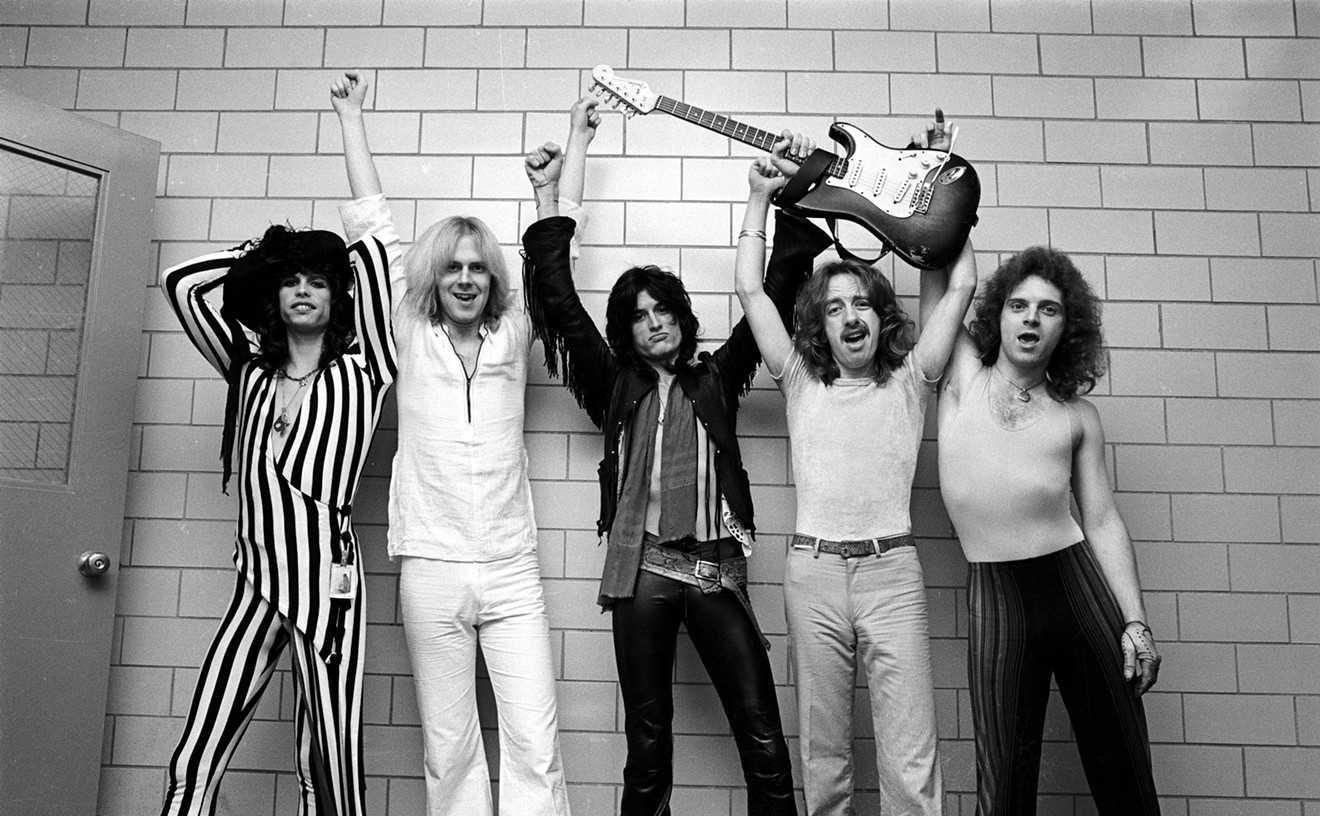Sometimes, however, irony comes equipped with a sincere lining. "I like the old ones," Schmersal offers. "I'm still using an Atari 800. So I like to play Necromancer and Archon." It's a pastime that reveals as much about Enon's music as it does its recreational preferences.
There are moments on Hocus-Pocus when you wonder whether you didn't accidentally turn on shuffle mode.
The contrast between songs startles. Enon's three members -- songwriters Schmersal (guitar) and Toko Yasuda (bass), along with Matt Schulz (drums) -- range widely, augmenting the impression of diversity on Hocus-Pocus by dissolving one track into the next, much like a DJ's mix tape. When the dreamy electro-pop of the first track "Shave" gives way to the second coming of New Wave in "The Power of Yawning," the record's extremes are already apparent: soprano vs. tenor, keyboard vs. guitar, slow vs. fast and, ultimately, Toko Yasuda vs. John Schmersal.
But it's the space in between that's most interesting: the distorted bottom end that burns some of the sugar off of Yasuda's "Daughter in the House of Fools"; the open-throated male vulnerability of Schmersal's "Candy"; the risky passing of the baton between them on "Starcastic." And if you listen closely, through all of Hocus-Pocus' hairpin turns, you start to hear the common elements that tie the record together: the crackle of a cheap Casio at full volume, bass clipped like a new cadet, low-tech bleeps and bloops from the Tron era. It's the sonic landscape of the Atari age.
Whether critics regard Enon's mélange of styles as a sign of productive tension or the sort of "creative differences" that can break up the band, they inevitably zero in on the contrast. Schmersal, for one, isn't sure why.
"I think it's crazy, because there have been lots of records that have tried to be varied," he says. "This is certainly not the first record that has different kinds of songs on it! It's a shame that right now things are much more homogenized as far as styles are concerned. Maybe our record looks very strange in comparison to the other records that are coming out."
Much like the songwriters' previous bands -- most notably Blonde Redhead for Yasuda and Brainiac for Schmersal -- Enon has proven an elusive target for critics seeking to define their sound. Yasuda is happy to make music that resists categorization.
"It's a good thing, I think," she volunteers, discussing the band's commercial potential. Schmersal isn't so sure: "As far as the nuts and bolts of selling records goes, I guess we're not the people to ask about that."
Then again, you could say that about almost everyone in the industry these days. When music makes the headlines now, it's usually because someone is being sued for stealing it. To a startling degree, people have become more interested in the medium than the message. Fans download songs because it's easy. Whatever else you want to say about the Recording Industry Association of America's strategy in suing its target market, at least it has the virtue of restoring the psychological cost of music consumption. Time was, you had to labor long and hard to decide which record to take home. A mistake could ruin your day, week or month. But the process of deliberation and the gap between purchases made the music you liked sound sweeter. The triumphs took the form of albums you bought, hesitantly, for the singles, only to discover that other songs were even better. In destroying this simple pleasure, the rise of file sharing and its legal substitutes has irrevocably changed our feelings about music.
Schmersal and Yasuda are old enough to remember life before the Internet explosion. They still obsessively take field trips to the record store. It's an activity that used to be as instinctive as breathing for music fans. But, if you believe the news reports on the recent RIAA lawsuits, it's destined to become as quaint as playing Defender.
For Schmersal, though, the record store is still the measure of music consumption, even when he is remarking about how things have changed. "There's so much music," he says. "It's really boggling when people ask us to nail down some influences. You go in the record store, you're excited and you want to buy records, but you can't necessarily remember what you like anymore for some reason. So you end up fishing through the bins. I feel like I should just write up a big list of things that I like. But it's so hard now. You get asked and maybe you'll spit out three. And if someone were to put those three names in the computer . . . it's kooky."
After lamenting the fact that he hasn't had the money to do much shopping of late, he excitedly notes that "Toko went and got the Mars Volta record." It may not be the most earth-shattering confession, but it still speaks volumes about the band's priorities.
Hocus-Pocus is the sort of album that, in the old days, would have made up for 10 bad consumer choices. The songs are strong out of the gate, but they also have staying power. You can turn up the volume and bounce around, put it on as background music while pruning the mesquite tree, or enjoy the stereo separation while spacing out to your headphones. And, unless you have had a particularly strong dose of coffee or some harder substance, there's a good chance that you'll let the record play to the end. This is what the critics who complain that Enon's records aren't sufficiently cohesive fail to see. The album's variety is not a problem but a solution. It responds to the crisis in the music business the only way that will work, by making a record that people will truly want to own.
Comparing Hocus-Pocus to Enon's previous album High Society, Schmersal describes the new record as "way more stripped down. We were on a time constraint. We had a bunch of touring to do, and if we wanted the record to come out in the fall, we needed it to be done by April. But I felt the time constraint was really useful. It seems like, with computers, everyone says, It's so easy now. You can do multiple takes and all this stuff.' And then what people end up doing is just having too much stuff to look through, instead of taking more of the purist approach where you have to rewind the tape, but, at the same time, you get the good take and you know it's the good take instead of going through 30 sections of a part or something. We tried to be kind of punk about the way we did stuff and just, you know, get it and decide that was that."
Hmmmm . . . he said "punk." When most people think of punk, they still picture a fast, loud, simple guitar band. The electronic treatment of vocals and instruments has long carried an aura of preciousness, at least in the United States. But that perception is starting to change.
Schmersal's first band, the greatly lamented Brainiac, which dissolved after lead singer Tim Taylor was killed in a car accident, helped to lead the way. Enon does an admirable job of continuing the mission. You feel it most in the fuzzy logic of the rhythm section.
"I'm pretty picky with the programming sound," notes Yasuda. Yet it's the integration of Schulz's live drums that really makes the difference. "If I write a song with a drum machine," she continues, "we'll give it to Matt and jam. And then when we're actually making records, it's all about how you can make it sound natural. Mixing is very important for that."
Schmersal concurs. "The whole organic vs. digital thing is something we were experimenting with at the end of Brainiac," he says. "Recently, someone was asking Thom Yorke why so many rock bands are afraid of electronics and he said, I don't know.' I sort of feel the same way. It seems like people are afraid of their stuff sounding really cold. But there's a way of using electronics that can be really organic and warm-sounding."
Yasuda chimes in: "And fun!"
It's no accident that Schmersal's choice of gaming consoles comes from the era when computers were breathing fresh air into the music business, not suffocating it. Above all else, Enon songs recall the years between the Sex Pistols and Van Halen's "Jump," between the debut of the Apple II and the dominance of the IBM PC. It was an era when home computers were still a hobby and musicians were proud to include drum machines in their album art and videos.
Back then, using computers struck the sober-minded as more trouble than it was worth. But the extra effort computers required made them a passion. As we ride out the major labels' perfect storm, it will be wise to recall the futurist optimism of a time when making the computer "Man of the Year" wasn't an ironic prank.
And Enon has the ideal soundtrack for the journey, because they know how to turn nostalgia into hope.










